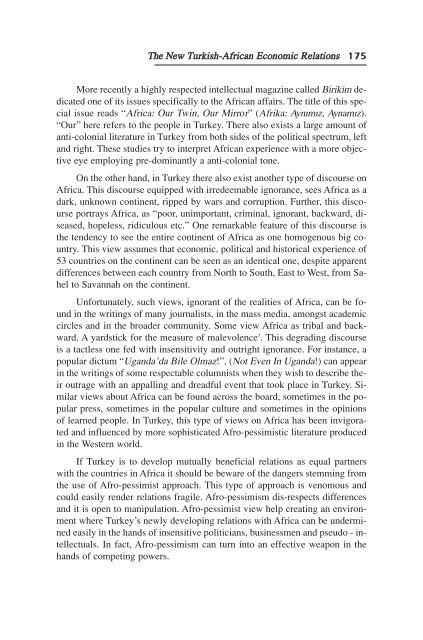EN - FR - Yükselen Afrika ve Türkiye / Rising Africa and Turkey 3
EN - FR - Yükselen Afrika ve Türkiye / Rising Africa and Turkey 3
EN - FR - Yükselen Afrika ve Türkiye / Rising Africa and Turkey 3
You also want an ePaper? Increase the reach of your titles
YUMPU automatically turns print PDFs into web optimized ePapers that Google loves.
The New Turkish-<strong>Africa</strong>n Economic Relations 175More recently a highly respected intellectual magazine called Birikim dedicatedone of its issues specifically to the <strong>Africa</strong>n affairs. The title of this specialissue reads “<strong>Africa</strong>: Our Twin, Our Mirror” (<strong>Afrika</strong>: Ayn›m›z, Aynam›z).“Our” here refers to the people in <strong>Turkey</strong>. There also exists a large amount ofanti-colonial literature in <strong>Turkey</strong> from both sides of the political spectrum, left<strong>and</strong> right. These studies try to interpret <strong>Africa</strong>n experience with a more objecti<strong>ve</strong>eye employing pre-dominantly a anti-colonial tone.On the other h<strong>and</strong>, in <strong>Turkey</strong> there also exist another type of discourse on<strong>Africa</strong>. This discourse equipped with irredeemable ignorance, sees <strong>Africa</strong> as adark, unknown continent, ripped by wars <strong>and</strong> corruption. Further, this discourseportrays <strong>Africa</strong>, as “poor, unimportant, criminal, ignorant, backward, diseased,hopeless, ridiculous etc.” One remarkable feature of this discourse isthe tendency to see the entire continent of <strong>Africa</strong> as one homogenous big country.This view assumes that economic, political <strong>and</strong> historical experience of53 countries on the continent can be seen as an identical one, despite apparentdifferences between each country from North to South, East to West, from Sahelto Savannah on the continent.Unfortunately, such views, ignorant of the realities of <strong>Africa</strong>, can be foundin the writings of many journalists, in the mass media, amongst academiccircles <strong>and</strong> in the broader community. Some view <strong>Africa</strong> as tribal <strong>and</strong> backward.A yardstick for the measure of malevolence 3 . This degrading discourseis a tactless one fed with insensitivity <strong>and</strong> outright ignorance. For instance, apopular dictum “Ug<strong>and</strong>a’da Bile Olmaz!”, (Not E<strong>ve</strong>n In Ug<strong>and</strong>a!) can appearin the writings of some respectable columnists when they wish to describe theiroutrage with an appalling <strong>and</strong> dreadful e<strong>ve</strong>nt that took place in <strong>Turkey</strong>. Similarviews about <strong>Africa</strong> can be found across the board, sometimes in the popularpress, sometimes in the popular culture <strong>and</strong> sometimes in the opinionsof learned people. In <strong>Turkey</strong>, this type of views on <strong>Africa</strong> has been invigorated<strong>and</strong> influenced by more sophisticated Afro-pessimistic literature producedin the Western world.If <strong>Turkey</strong> is to de<strong>ve</strong>lop mutually beneficial relations as equal partnerswith the countries in <strong>Africa</strong> it should be beware of the dangers stemming fromthe use of Afro-pessimist approach. This type of approach is <strong>ve</strong>nomous <strong>and</strong>could easily render relations fragile. Afro-pessimism dis-respects differences<strong>and</strong> it is open to manipulation. Afro-pessimist view help creating an environmentwhere <strong>Turkey</strong>’s newly de<strong>ve</strong>loping relations with <strong>Africa</strong> can be underminedeasily in the h<strong>and</strong>s of insensiti<strong>ve</strong> politicians, businessmen <strong>and</strong> pseudo - intellectuals.In fact, Afro-pessimism can turn into an effecti<strong>ve</strong> weapon in theh<strong>and</strong>s of competing powers.





